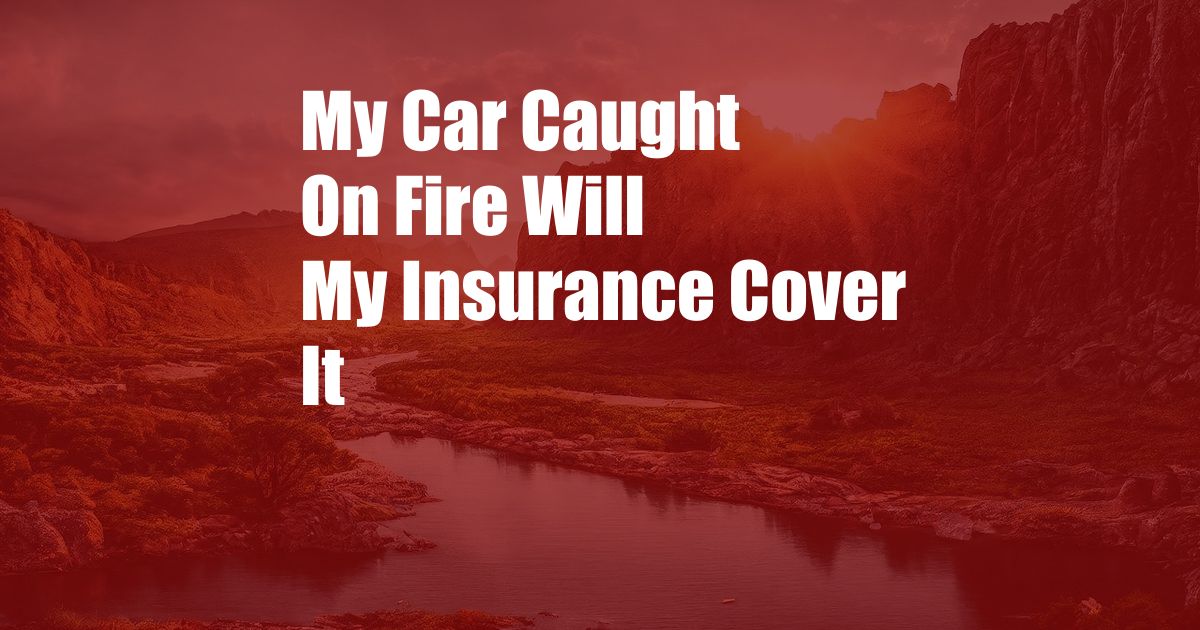
My Car Caught on Fire: Will My Insurance Cover It?
Imagine the horror of finding your car engulfed in flames. As your mind races, you wonder if the financial burden will crush you. But fear not, for insurance may come to your rescue. This article will guide you through the intricacies of car fire insurance coverage, providing peace of mind amidst the chaos.
Comprehensive Coverage: Your Protector in Fire’s Wake
Comprehensive coverage, often an add-on to your auto insurance policy, is your shield against non-collision damages, including fires. It covers a wide range of perils, such as vandalism, theft, and even falling objects. So, if your car becomes a victim of an accidental fire, comprehensive insurance will step in to ease the financial blow.
Understanding the Fine Print
While comprehensive coverage generally covers car fires, there may be exclusions or limitations. For instance, some policies might not cover fires caused by gross negligence or intentional acts. Additionally, the amount of coverage you have will determine the extent of the financial assistance you receive.
It’s crucial to thoroughly review your policy’s terms and conditions to fully understand what’s covered and what’s not. If you have any doubts, don’t hesitate to reach out to your insurance provider for clarification.
Comprehensive Coverage in Action
Let’s delve deeper into how comprehensive coverage works in the event of a car fire.
1. Report the Incident Promptly:
Notify your insurance company about the fire immediately. The sooner you report the claim, the sooner the process can begin.
2. Document the Damages:
Take pictures or videos of the fire damage and any other relevant evidence. This documentation will support your claim.
3. Provide Detailed Information:
Your insurance company will request a detailed account of the incident, including the date, time, and location of the fire. Be as accurate and comprehensive as possible.
4. Determine the Cause of the Fire:
If possible, determine the cause of the fire. This will help your insurance company assess the validity of your claim. However, it’s essential to avoid speculating or blaming others without evidence.
5. Receive Payment:
Once the insurance company has processed your claim and approved the coverage, you will receive payment to cover the cost of repairs or replacement, up to the limits of your policy.
Tips and Expert Advice
1. Get Regular Inspections:
Regular vehicle inspections can help identify potential fire hazards early on. Pay attention to electrical issues, fuel leaks, and any other anomalies that could increase your risk of a fire.
2. Park in Safe Locations:
Avoid parking your car in areas prone to fires, such as near brush or under trees. Also, keep your car away from flammable substances like gasoline or fireworks.
3. Install Fire Extinguishers:
Having a fire extinguisher in your car can be extremely helpful in containing a small fire before it spreads. Ensure that you know how to use it properly.
4. Consult with Insurance Professionals:
If you have any questions or concerns about your car fire insurance coverage, don’t hesitate to consult with your insurance agent or broker. They can provide personalized advice based on your specific needs and policy details.
Frequently Asked Questions
Q: What if my car was intentionally set on fire?
A: Intentional acts, including arson, are typically not covered by comprehensive insurance. However, you may explore other legal avenues to recover damages.
Q: How does comprehensive coverage differ from collision coverage?
A: Collision coverage protects your car from damages caused by collisions with other vehicles or objects. Comprehensive coverage covers non-collision-related damage, such as fires, theft, and vandalism.
Q: What is the deductible for car fire insurance?
A: The deductible is the amount you pay out of pocket before your insurance coverage kicks in. The deductible varies depending on your policy and can affect your insurance premium.
Conclusion
If your car falls victim to the devastation of a fire, comprehensive insurance can provide a lifeline, covering the cost of repairs or replacement. By understanding the ins and outs of your policy, following safety tips, and seeking expert guidance when needed, you can ensure that your financial well-being remains protected.
Are you interested in learning more about car fire insurance and how it can safeguard your vehicle? Reach out to your insurance provider today or explore additional resources online to stay informed and prepared.